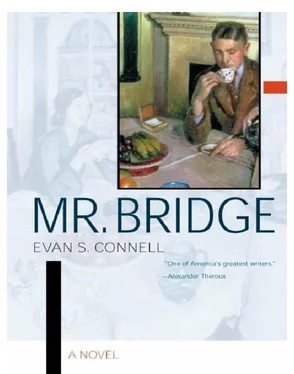“Yes, I know him.”
“You seem surprised.”
He got up without answering and went to the telephone.
“Sorry to bother you,” the officer said.
Mr. Bridge waited.
“You employ a Miss Harriet Rodgers?”
“Go on.”
“She was picked up a short while ago.”
“I appreciate your calling me. I’ll be there in twenty minutes.”
When he returned to the living room Mrs. Bridge remarked, “You just wonder why people telephone at this time of night.” But then she noticed his face. “Oh, dear, was it important?”
“I’ll be going out for a while,” he said, and went to the hall closet for his hat and coat.
Harriet had been crying. Her features were puffy, her make-up was smeared, and she resumed crying the instant she saw him. He ordered her to get control of herself, which she did, but she broke down again an hour later on the way home. Sniveling and choking with emotion, she continued to insist that she had been an innocent bystander, a victim of circumstances, it was all a terrible mistake, the whole affair was Couperin’s fault, and so on and so forth.
Mr. Bridge listened to as much of this as he cared to, and while they were driving out Pershing Road he told her there was no point in discussing it any further. “I do not want to hear any more,” he said. “I believe I can manage to get you out of this, so you may as well stop blubbering. But I am not going to bat for this man you chase around with. He will have to pay for his foolishness. I refuse to get myself involved any further. And I want you to remember,” he added, shaking a finger at her, “I have placed myself in a position I dislike. I dislike it very much indeed. Should anything of this nature happen again, ever, you are through. Is that clear?”
She assured him it would not happen again. Then she went on with a sanctimonious air, “That Couperin, I could just kill him. As far as I personally am concerned he ought to be locked up in jail the rest of his days. Trouble is his middle name.”
Mr. Bridge was disgusted by her fickleness. Not two hours earlier she had been very much a part of Couperin’s big evening.
“It was account of that automobile,” she said as though reminiscing about a vacation. “Since he got hisself that Pontiac he is just plain uncontrollable. You’d think a person would learn, finally. Not him, though. Well, at least I am glad to say I surely have learned my lesson.”
“I hope you have,” Mr. Bridge said.
They drove through Penn Valley Park and up Broadway and she was all right, but then she started to sniffle.
“Now, you stop,” he said. “I have had more than enough.”
“Feel so ashamed.”
“It has been disagreeable and humiliating for us both.”
She sobbed into her handkerchief. “That Couperin.”
In a voice that was almost a shout Mr. Bridge said: “Shut up!” which was an expression he had not used for many years.
As they were turning into the driveway she wiped her nose, coughed rather delicately, and fluffed her hair with her fingertips. Evidently she was getting organized for an appropriate entrance, in case Mrs. Bridge or the children should be in the kitchen to greet her.
“I wish to thank you again,” she said.
“All right,” he answered, guiding the Chrysler into the garage.
“I frankly do not know what might have become of me in that there police station without assistance.”
“I could tell you.”
“As you know, this was my first police experience. However, they were very nice and gentlemanly, I must say.”
“Let’s hope this is your last experience with the police.”
“I’m perfectly sure it will be,” she said. “Somehow they do leave a person mortified to death.” Then, having once more touched up her hair, she inquired: “Shall we go in?”
During the holiday season Harriet was observed to put away several daiquiris, and Mrs. Bridge was of the opinion that she was becoming much too fond of them. Mr. Bridge answered that an occasional snort was not going to do her any harm. If she had taken this many years to get around to it she was not apt to become an alcoholic.
But Mrs. Bridge said, “I believe I’ll speak to her. I found two glasses on the drainboard the other day. I think two in one day is one too many.”
He slipped an arm around her waist and suggested they stop worrying. The idea of Harriet drinking too much amused him, and the next time he saw her with a daiquiri he told her that she had better have another because nobody can walk on one leg.
After being warned by Mrs. Bridge, Harriet resolved to quit drinking. Mrs. Bridge had not spoken severely, nor even pointedly, yet there could be no mistake, it was a warning. Furthermore, it was humiliating. Not more than that, but it certainly was humiliating. She did not think her position was in danger, she had been employed too many years to be dismissed lightly; she was sure they knew this. However, a word to the wise was sufficient.
Some time went by while she considered the best way to stop, and finally she decided that instead of giving up the daiquiris all at once she should give them up gradually in order to avoid a shock to her system. She felt that her system had become accustomed to a daiquiri or so every now and again. A suitable program should be to leave a few sips in the glass, and leave a few more sips each time. That would be easy, and the body fluids would not be disturbed and remorseless. She devised this program one stormy Tuesday night while doing the dishes. Mr. and Mrs. Bridge had gone to a party at the Lutweilers and would not come home until late. Ruth was visiting Dodie. Carolyn was in the basement. Douglas had gone to his Scout meeting.
She began to sing. One song after another came into her head. She sang “Ananias” and “Standing in the Need of Prayer” and “Ezekiel Saw the Wheel.” Lightning flashed, thunder rolled, windowpanes rattled. Rain poured against the side of the house. She sang “Just a Closer Walk with Thee” and “Jacob’s Ladder” and “Blessed Assurance” and “Wade in the Water” and “Precious Lord” and “There Is Balm in Gilead.” Feeling a bit exhausted by so much song, she decided to refresh herself with a daiquiri. Then she resumed singing, and she sang until midnight.
Dr. Sauer was at the Lutweiler party wearing his yellow socks, and as his trousers were cut two inches short the yellow socks could be seen drifting here and there as though they possessed a life of their own.
“I don’t understand that man,” said Mr. Bridge. “I do not for the life of me understand that fellow.”
Mrs. Bridge, trying to defend him, suggested that perhaps short trousers and bright socks were the style in Europe.
“And what about this girl he’s with? This Genevieve, or whatever her name is.”
“She must be his daughter, don’t you suppose?”
“His daughter is back East at some boarding school. Who in the name of all that’s holy this girl is, I have no idea.”
Before the party was over they found out. Genevieve was a student at the Kansas City Art Institute. Genevieve, unable to put up with life in Chillicothe, unable to live with her father because he owned a hardware store and with her mother because she was her mother, had fled to Kansas City, where the streets were paved with gold and a girl could study art without being nagged about it and nagged about marrying Howard Bagley. Howard Bagley thought the hardware business had a great future. Genevieve revealed all. She announced that she had been a mess when somebody told her about Dr. Alexis Sauer. Now everything was fine.
Читать дальше












